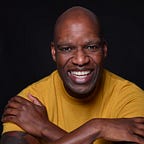I blocked him… and it was such a childish thing to do
In an age where everyone has a platform to bash each other publicly, have we lost the art of respectful adult communication?
Yesterday I did something I’d never done before: I blocked someone on Medium. It started with a snarky, rant-y comment on one of my articles and devolved into an ugly back-and-forth that had nothing to do with the article.
I’ve been kicking myself (proverbially, not literally) over the exchange and the subsequent blocking ever since everything went down. I haven’t blocked or unfriended anyone in years, not even over Donald Trump. The last time I made such a move was when I unfriended my favorite aunt after she shared a homophobic Facebook post in response to gay marriage being legalized in the United States.
The offense of my Medium blockee and the blockee himself were considerably less significant, which is part of why I’m struggling with the non-conversation. I’m also struggling with our four-part exchange (he said/I said/he said/I said) because it reflects an unfortunate communication cliché of social media: Online conversation often isn’t conversation at all. Instead of talking to each other, we talk at each other. I’m guilty of it, too.
It seems to be getting worse. Maybe it’s the influence of a tweet-happy U.S. President, but when people disagree, snark regularly trumps respect. (As a general rule, “Um, no…” and “You’re wrong” are mot good ways to begin a comment if you are interested in launching a civilized discussion.)
I write about polarizing topics and ones that inspire strong opinions (race, sexuality, the arts, travel, daytime soaps), so I expect dissenters. I frequently raise the ire of the masses and have to duck when they throw rotten tomatoes at me. I’ve been a professional journalist for nearly 30 years now. I know the drill.
At the beginning of my career, I wrote music reviews for People magazine. The first death threat someone sent me was over a negative review of an R. Kelly album. I’ve been fielding harsh criticism ever since.
The mini-backlash over my un-rave R. Kelly review was in the days of snail mail, before Facebook, Twitter, and comment sections became the main forums for public discourse and verbal lashings. Comments on my work back then were drastically fewer and farther between. They took a lot longer to reach me, and as I’ve never been much of a letter writer, not once was I compelled to respond. Now that commenting and replying are both so immediate, you can spend more time on reader feedback than you do writing whatever instigates it.
Last year, when I dared to criticize Beyonce in a HuffPost essay, Twitter bullies targeted me unrelentingly with everything from personal digs to death threats. I permanently deleted my Twitter account and extricated myself from most forms of social media. I vowed to read only the comments posted on my personal blog. I’d let the members of the peanut gallery discuss everything else amongst themselves without my interference.
I’m still on Facebook (where I tend to deactivate for months at a time to retain my sanity), so I sometimes get private messages about articles I’ve written. Some of them are unnecessarily nasty, but I find that if people take the time to message me on Facebook and do so non-anonymously, they’re more likely to engage in an actual discussion rather than grandstanding and playing to the crowd.
One of the reasons I’ve enjoyed being part of the Medium community is because I’m communicating with a large circle of fellow writers who have had many of the same experiences I have had. They know how vulnerable writing makes you. They know how it feels to pour so much time, effort, and heart into something and then have someone diminish it by dismissing it with a snarky comment or a misrepresentation of what you’ve written.
For the most part, my experience here has been a good one. Even when people don’t agree with my point of view, they typically dissent respectfully. Sometimes it’s not even about agreeing or disagreeing but about sharing something sparked by what I’ve written.
This is why I write. I write to get things off my chest, but I also want to inspire thought and dialogue. Sometimes readers enlighten and influence me by respectfully disagreeing with me. If I want to read anger and vitriol, there are plenty of comment sections all over the internet where people have colorful and vulgar showdowns. And of course, there’s the U.S. President’s Twitter feed.
I don’t want to ignore comments on my Medium posts because I receive mostly thoughtful ones. I’ll have to just suck it up and deal with the bad that will inevitably accompany the good.
But getting back to the person I blocked yesterday, my biggest regret isn’t that I blocked him but that I took the bait. I wish I had allowed him to rant and moved on without feeling the need to respond. I accused him of overreacting to one sentence in my article, and then I went and did the same thing to his comment.
Um, no… not cool. I regret doing that. I don’t know if “blocked” on Medium means that someone simply can’t communicate with you or if they can’t read your articles either, but dear blocked reader, if you’re reading this, I’m sorry for overreacting.
That said, opening lines, like first impressions, set the tone for everything that follows. I wish you had used one that was less confrontational.
But I don’t want to be the guy who fights ire with ire. I want to do better. Hopefully, those who disagree will do the same.
